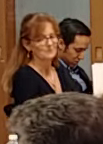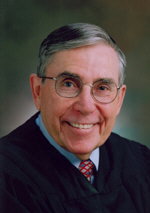
Public records are open to inspection at all times during the office hours of the state or local agency and every person has a right to inspect any public record, except as hereafter provided.
Consequently, last Thursday I went over to HPOA secret headquarters on Hollywood Boulevard to read through this material, something I plan to make a regular habit of doing.

Read on for what it said:
Compliance with Public Records Act: Morrison informed the Board that she received a letter from Bernard Franklin, of Hollywood Horizons Partnership, requesting a copy of the Burke Security contract on February 5, 2003. Morrison responded to Mr. Franklin’s request on February 6, 2003, by mailing a copy of the contract in confidence, with an attached letter indicating that she was awaiting advice from the Los Angeles City Clerk, relative to the propriety and/or confidentiality of vendor contracts under the Public Records Act. On February 18, 2003, Morrison received a letter, written on behalf of Mr. Franklin, by Dennis Winston, from Moskowitz, Brestoff, Winston & Blinderman, asking for clarification relative to her request for Mr. Franklin to keep the contract confidential. Morrison distributed copies of all three letters, and indicated that she found the letter, written by Mr. Winston, “very offensive,” for the reason that she responded to Mr. Franklin’s request in a timely manner, and was in the process of obtaining advice from the City Clerk relative to requests for contracts. The Board suggested that Morrison submit a letter in response, reiterating the precedent nature of the request, and indicating that all requests were granted within 24 hours of Mr. Franklin’s letter.
Well, plus ça change, plus c’est la même chose, amirite? Let’s take this jive one piece at a time:
Morrison responded to Mr. Franklin’s request on February 6, 2003, by mailing a copy of the contract in confidence…
The problem here is that public records are public. Why in the world would anyone think that you could send someone a public record and enjoin them to keep it confidential? Well, possibly because you don’t think the law applies to you. This is a constant theme with the HPOA. I understand that Kerry wasn’t sure of the proper course of action here, but then why did she send the contract to the guy? If it’s disclosable it’s public, and if it’s not disclosable it’s not disclosable in confidence.
…with an attached letter indicating that she was awaiting advice from the Los Angeles City Clerk, relative to the propriety and/or confidentiality of vendor contracts under the Public Records Act.
This is very interesting indeed. The standard contract that BIDs sign with the City, enforced by the City Clerk, has a clause making them subject to CPRA. Thus it’s eminently reasonable to ask the Clerk about interpretations of what the BID is bound to here. In fact, my current working theory4 on this is that the City Clerk, based on the Los Angeles City Contractor Responsibility Ordinance, has an affirmative duty to enforce BIDs’ compliance with CPRA. If this pans out it will be immensely useful as it will add at least one more layer of administrative appeals over CPRA/BID matters before a lawsuit becomes necessary.
However, in these latter days some people in the BID section of the Clerk’s office, notably Rosemary Hinkson and Miranda Paster, have been remarkably unsympathetic to this argument. This is nothing new. In 2004, for instance, the L.A. Times reported that the Clerk’s office “‘believed their role was limited to assistance in organizing’ the districts, collecting money and gathering reports” and that then-clerk Michael Carey claimed that his office “did not have the staff or the inclination to manage the districts.” However, Holly Wolcott, the current Clerk, seems at least willing to listen. In this context it’s fascinating to see Kerry Morrison in 2003 turning to the Clerk for advice on how to follow the law. What’s strange, though, is that she somehow expects the public to wait for that advice to come through. After all, this is around two years after BIDs were declared subject to CPRA. Why hadn’t such matters been ironed out already? I suppose we’ll never know.
On February 18, 2003, Morrison received a letter, written on behalf of Mr. Franklin, by Dennis Winston, from Moskowitz, Brestoff, Winston & Blinderman, asking for clarification relative to her request for Mr. Franklin to keep the contract confidential. Morrison distributed copies of all three letters, and indicated that she found the letter, written by Mr. Winston, “very offensive,” for the reason that she responded to Mr. Franklin’s request in a timely manner, and was in the process of obtaining advice from the City Clerk relative to requests for contracts.
Again with the chutzpah. Yes, she responded in a timely manner. But she responded with a weirdly unsupportable request to keep the material confidential. No one could possibly understand what to make of this request, since it makes no sense whatsoever. But it’s offensive to ask for clarification? I suppose ’twas ever thus.
The Board suggested that Morrison submit a letter in response, reiterating the precedent nature of the request, and indicating that all requests were granted within 24 hours of Mr. Franklin’s letter.
See the arrogance? The “precedent nature of the request” means everyone should just wait around for an answer? Well, that’s not unreasonable. If they didn’t know what to do, though, why do anything at all until they did know what to do? CPRA certainly accounts for confusion on the agency’s part, e.g. in the clause that allows them up to 24 days to consult about requests and to say how long it’s going to take them to decide what to do, not to mention the fact that there’s essentially no deadline at all for the production of records as long as agencies respond within 24 days about how long they expect their preparations to take. Also, perhaps the request had a “precedent nature” with respect to the HPOA, but they weren’t inventing the wheel here. Certainly by this late date everyone knew already that contracts were public records. The freaking City of Los Angeles puts its contracts on its web site. Certainly they were publicly available in 2003. But every day’s a new day, innit?
TL;DR is that Kerry Morrison fired off a premature response asking for something she had no right to ask for, got offended when someone asked her what she was talking about, and then the Board enabled her mishandling by blaming the victim. Pretty much how they roll these days also, it turns out.
Image of Kerry Morrison (and Joe Mariani) is ©2016 MichaelKohlhaas.org. Image of Justice Walter Croskey is a public record and I found it here.
- I discovered recently that it’s possible to bring one’s own scanner to record inspection sessions, but I didn’t feel comfortable using it here, since Kerry Morrison allowed me to inspect the actual physical archival copies of the minutes and, even though my scanner is pretty good, it does still chew up a page now and then. This has no consequences for the nonce copies produced by City agencies, but it would be a huge sin to mess up archival copies of the BID’s records. Hence I’m just waiting for Kerry to copy them for me and planning to pay the HPOA’s costs.
- I recently learned that the cool kids pronounce this “SIP-rah,” and that’s the pronunciation I have in mind throughout this post and beyond!
- A nondestructive albeit quite inefficient means of making copies of archival records.
- Which I’m in the process of testing out against the DCBID and their unsupportable refusal to comply with CPRA; more news as it happens.
